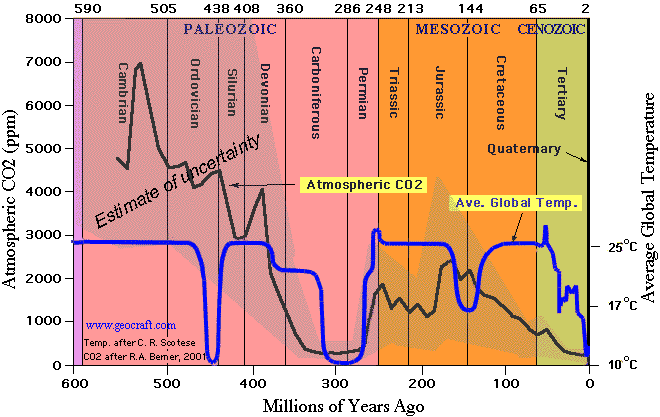
I don't see it. There is no correlation.
Posted on 08/02/2005 9:27:19 PM PDT by Ernest_at_the_Beach
Bacteria froze the Earth, researchers say
By Michael Kanellos
Story last modified Tue Aug 02 17:15:00 PDT 2005
Humans apparently aren't the first species to change the climate of the planet. Bacteria living 2.3 billion years ago could have plunged the planet into deep freeze, researchers at the California Institute of Technology claim in a new report.
Several graduate students, along with supervising professor Joe Kirschvink, have released a paper presenting their explanation of what caused "Snowball Earth," a periodic deep freeze of Earth's atmosphere that has been theorized for years. The Caltech team argues that 2.3 billion years ago, cyanobacteria, or blue-green algae, gained the ability to break down water, which in turn released a flood of oxygen into the atmosphere.
That oxygen reacted with the atmospheric methane, which insulated the Earth at the time, and broke it down. While the oxygen-methane reaction created the greenhouse gas carbon dioxide, the protective nature of the barrier cracked.
Temperatures plunged to minus 50 degrees Celsius, and ice at the equator grew to 1 mile thick. Although this process took several million years, substantial damage to the methane layer could have occurred in the first 100,000 years.
Life-forms only recovered after microorganisms, clinging then to thermal vents or living underground, evolved the ability to consume oxygen and turn it into carbon dioxide.
It was a close call to a planetary destruction," said professor Kirschvink, who oversaw the project, in a prepared statement. "If Earth had been a bit further from the sun, the temperature at the poles could have dropped enough to freeze the carbon dioxide into dry ice, robbing us of this greenhouse escape from Snowball Earth."
Carbon dioxide concentrations became so high over millions of years that the temperature soared to 50 degrees Celsius. As the solar system aged, Earth's mood swings became less extreme.
Scientists have known for a number of years that Earth plunged into one of its periodic ice ages 2.3 billion years ago, a change reflected in glacially formed rocks in Canada. The cause, however, has been the subject of debate. Many experts have said that cyanobacteria evolved to break down water between 3.8 billion and 2.7 billion years ago, too early to cause the deep freeze.
The Caltech team believes the answer lies in the movement of glaciers at the time around the middle latitudes of the planet, which in part is borne out by magnetic readings of the Canadian rocks. The glaciers scraped iron, phosphorous and other nutrients off existing rocks. These ran into the ocean and provided food for a massive algal bloom.
"We could still go into Snowball if we goof up the environment badly enough," Kirschvink said. "We haven't had a Snowball in the past 630 million years, and because the sun is warmer now it may be harder to get into the right condition. But if it ever happens, all life on Earth would likely be destroyed. We could probably get out only by becoming a runaway greenhouse planet like Venus."
Yes, I wonder...
Okay, we did. There, you happy now? LOL
Huh? Glaciers form rocks now?
Another theory, for more recent ice ages:
http://www.freerepublic.com/focus/f-chat/1455668/posts
So Global Warming saved the Earth?
"Glacially formed rocks" means pushed into their current configuration.
You did, didn't you get the memo? LOL
Yes, Global warming saved the Earth, keep driving your SUV>
Now I know that driving my SUV is doing my part for the salvation of mankind!

I don't see it. There is no correlation.
snowball ping!
I don't see it there either.
Well, up here in the Pacific Northwest, if it had not been for Global Warming, my property would be under a glacier right now.
More importantly, this graph shows fluctuations of atmospheric CO2 in the hundreds and thousands of parts per million. Human activity is thought to increase CO2 annually at a rate merely 2 parts per million above what it would be otherwise. There is no real comparison. Meanwhile, there is also no serious dispute that carbon dioxide acts as a 'greenhouse gas' but it is hardly the only factor in determining the global climate. The far more important factor would seem to be tectonics and long-range variations in solar output IMHO.
"climactic" should be climatic.. I always screw that up!
Wacko and radical environmentalists are in a dilemma. They don't know if they should demonstrate or not outside the headquarters of the DNC, whose members are suspected to be direct descendants of those bacteria.
Okay, Blam, Ernest, no ping for 'Civ? ;'}
Ice age bacteria brought back to life
www.NewScientist.com | 2/25/2005 | Kelly Young
Posted on 02/25/2005 12:57:59 PM PST by aimhigh
http://www.freerepublic.com/focus/f-news/1351150/posts
World-first technology enables study of ancient bacteria [Bermuda Triangle too]
Cardiff University via UrekAlert | 06 June 2005 | Professor R.John Parkes
Posted on 06/07/2005 4:18:16 AM PDT by PatrickHenry
http://www.freerepublic.com/focus/f-news/1417990/posts
Please FREEPMAIL me if you want on, off, or alter the "Gods, Graves, Glyphs" PING list --
Archaeology/Anthropology/Ancient Cultures/Artifacts/Antiquities, etc.
The GGG Digest -- Gods, Graves, Glyphs (alpha order)
Disclaimer: Opinions posted on Free Republic are those of the individual posters and do not necessarily represent the opinion of Free Republic or its management. All materials posted herein are protected by copyright law and the exemption for fair use of copyrighted works.